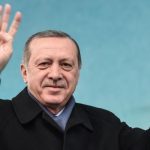Qatari Deputy Prime Minister and Minister of State for Defence Affairs Khalid bin Mohammad al-Attiyah welcomes Turkish President Recep Tayyip Erdogan (L) upon his arrival in Doha. (AFP)
LONDON – Turkish President Recep Tayyip Erdogan has arrived in Doha Thursday, where he is to meet with Qatari Emir Sheikh Tamim bin Hamad al-Thani on his first overseas trip since the start of the coronavirus pandemic.
According to a statement by Turkey’s Communications Directorate, Erdogan and the Qatari emir will exchange views “on regional and international issues.”
The Turkish delegation accompanying Erdogan includes Treasury and Finance Minister Berat Albayrak, Defence Minister Hulusi Akar and Communications Director Fahrettin Altun, Presidential Spokesman Ibrahim Kalin and National Intelligence Organisation head Hakan Fidan.
The two countries signed a number of deals and memoranda of understanding, which included an agreement on the arrangements for bilateral currency exchange (Qatari riyal and Turkish lira) between the Qatari Central Bank and the Central Bank of Turkey.
The Qatar Financial Centre Authority signed a memorandum of understanding with the Finance Office of the Turkish Presidency, according to a joint statement released today after the meeting between Erdogan and Sheikh Tamim in Doha.
The two parties also signed an agreement on industrial and technological cooperation, as well as memoranda of understanding between the Investment Promotion Agency in Qatar and the Turkish Investment Office for cooperation in the field of civil planning.
Another agreement was signed between the Qatari Public Works Authority (Ashghal) and the Turkish Standards Institute (TSE), with a joint declaration of intent to establish a laboratory with the aim of facilitating trade and enhancing consumer protection.
Ankara and Doha have enjoyed close relations, particularly since a diplomatic crisis with Qatar erupted on June 5, 2017, when Saudi Arabia, the United Arab Emirates, Bahrain and Egypt accused the Gulf country of supporting Islamist groups, also backed by Turkey, and having close relations with Iran, with the aim of destabilising the region and threatening the security of neighbouring countries.
Since the Arab quartet’s boycott, Turkey has set two military bases with hundreds of Turkish troops stationed there. To prove the usefulness of the bases, Erdogan’s intelligence is said to have fed the Qatari ruling family multiple warnings of impending coups aimed at making Ankara’s role in Doha look totally indispensable.
In recent years, Erdogan, disdained by his opponents and rivals who consider him to be opportunistic, has been using the Libyan conflict, and previously the Syrian conflict, to pressure Qatar into providing him with huge funds.
He has been doing this by warning the Qatari leadership that the Doha-backed Islamist camp could suffer a regional defeat that would be catastrophic for them, allowing their rivals to control strategic areas in the region.
“Qatari gas money has played a major role in financing those conflicts and wars, especially that Turkey cannot bear their burdens in light of the successive economic and financial crises witnessed by the country during the past years,” a former Turkish diplomat told The Arab Weekly earlier in June.
“The latest of these crises was the impact of the coronavirus pandemic, which battered the tourist sector, being an important source of revenue for the Turkish treasury.”
In recent days, the Turkish lira recorded a new drop of more than 1% against the US dollar, hitting its lowest level in about one month.
The economic crisis is not the first of its kind in Turkey, where the economy has witnessed a significant drawback in recent years, which observers directly link Ankara’s military and foreign policy misadventures abroad.
To carry out its foreign interventions, Turkey needs direct financial assistance from its ally Qatar, which has regularly pumped funds into the Turkish economy in the form of deposits and investments, adding up to some $15 billion by 2018, according to Qatari government statements.
Media reports, however, claim that the figure presented by Doha does not include all Qatari funds provided to Ankara, such as additional millions in direct donations from Qatari leaders and businessmen.
Source: Arab Weekly



